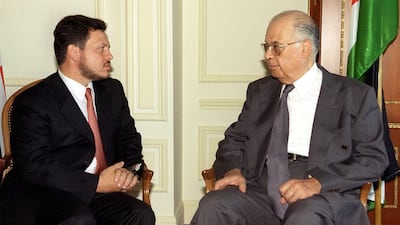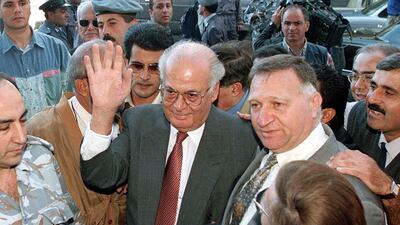Five-time Lebanese prime minister Salim Al Hoss, who served during some of the most tumultuous years of his country’s modern history, died on Sunday aged 94, the current premier said.
Caretaker Prime Minister Najib Mikati described Mr Hoss, who was also a former government minister and member of parliament, as the “conscience of Lebanon”, in a statement announcing his death.
Mr Mikati said Mr Al Hoss “passed away at the most difficult and delicate stage in which Lebanon needs its conscience”.
He was referring to fears that Lebanon could be pulled into a full-on war with Israel.
Lebanese militant group Hezbollah began attacking Israel a day after the start of the war in Gaza, which was started by the Hamas-led October 7 attack into southern Israel.
Israel and Hezbollah have exchanged fire almost daily since then, displacing tens of thousands of people on both sides of the border.
Mr Al Hoss “was a prominent economist and a role model for his expertise, ethics and knowledge", Mr Mikati said.
“He placed the country’s supreme interest and the interest of citizens above all considerations.”
The council of ministers has announced three days of mourning.
Former prime minister Saad Hariri echoed Mr Mikati's sentiments.
“Lebanon has lost a national figure, and Beirut has lost a dutiful son and a distinguished personality who devoted his life to the safety of its role,” Mr Hariri wrote in a post on X.
Mr Al Hoss was often described as a technocrat and widely respected as a rare statesman in a country marked by political and sectarian divisions.
Former adviser to the UAE Ministry of Foreign Affairs, Brigitte Khair-Mountain, said in a post on X: “I'm so sad that one of our rare statesmen who had integrity, love of country and humility has left us.”
“Lebanon sorely needs more men and women like PM Salim Al Hoss. It's a great loss for all – especially in our present times of turbulence and conflict.”
He served as prime minister for four terms during the country’s 15-year civil war between 1975 and 1990. His final term in office was from 1998 to 2000.
At one point, he presided over one of two duelling governments.
After the term of President Amin Gemayel ended in 1988 with no successor elected, Lebanon became ruled by two governments, one led by Michel Aoun in Maronite Christian east Beirut and another by Mr Al Hoss in Muslim west Beirut.
AP contributed to this report








